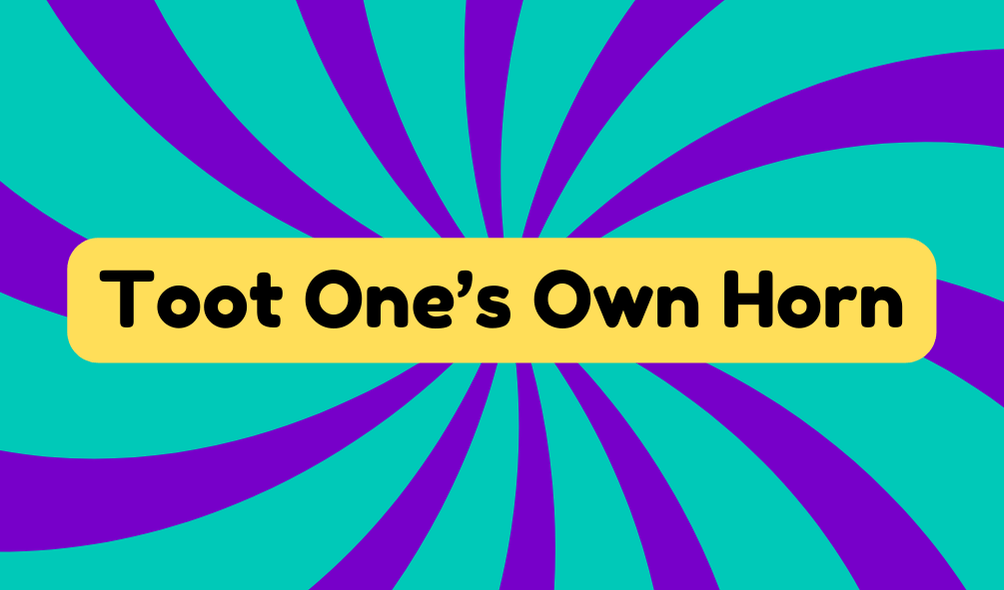Toot your own horn, and the world might just stop spinning for a moment to listen. Self-promotion often dances a fine line between confident assertion and obnoxious boasting. It's crucial to strike the right balance, or you risk diminishing the very achievements you aim to highlight. So, how can you effectively celebrate your successes without alienating those around you? Understanding the nuances of self-promotion could be the key to shaping not just your career, but also how others perceive your contributions.
What Does It Mean?
Tooting one's own horn means speaking boastfully about yourself and your achievements. While it can show self-confidence and help with personal branding, there's a thin line between promotion and pretension. You might think highlighting your skills can set you apart, but excessive bragging often backfires. Innovators may thrive on authenticity, and bombastic self-promotion can come across as disingenuous. Instead, finding a balance is vital; communicate your successes without overshadowing others. It's important to showcase your value, but remember that humility often resonates deeper than hollow boasts. By strategically sharing your accomplishments, you can build your personal brand while still displaying genuine confidence. So, embrace your achievements, but keep the horn to a reasonable volume.
Synonyms
When discussing the idea of boasting about oneself, several synonyms capture the essence of "tooting one's own horn." You might say someone is bragging about their personal accomplishments or drawing attention to their unique talents. However, there are subtle variations in meaning that can inform your self promotion techniques and boasting etiquette, such as:
- Self-celebration – Acknowledging your achievements without excessive pride.
- Pretentious self-promotion – Seeking validation through flamboyant displays.
- Bragging – Often perceived negatively, emphasizing exaggerated claims.
- Drawing attention to oneself – Highlighting talents in a more understated way.
Understanding these terms can help you navigate the fine line between healthy self-promotion and overstepping social boundaries. In today's innovative world, being savvy about such nuances is essential for success.
Example of Sentences
In conversations about self-promotion, you'll often hear examples that illustrate the concept of tooting one's own horn. Knowing how to navigate bragging etiquette is key, as you want to highlight your achievements without coming off as arrogant. Here are some self-promotion strategies to contemplate:
- Share your accomplishments during team meetings.
- Update your LinkedIn profile with your latest projects.
- Use social media to celebrate milestones respectfully.
- Craft a personal mantra that emphasizes your strengths.
When done right, tooting your own horn can enhance your reputation, but it's important to balance self-promotion with humility. Remember, it's about showcasing your value while keeping connections genuine and relatable.
Origin
The phrase "toot one's own horn" has intriguing origins that trace back to historical practices and literary references. Its historical significance lies in how horns were used as danger signals in 1447, and later, trumpets announced a king's arrival during celebrations in 1549. The phrase truly gained traction in the 19th century through the works of Anthony Trollope. By 1776, its adoption in the U.S. symbolized self-independence, reflecting a cultural impact that encouraged individuals to embrace self-advocacy. While it is crucial to celebrate achievements, one must consider the fine line between healthy promotion and self-aggrandizement. Ultimately, the phrase urges a balance between sharing successes and maintaining humility in an increasingly competitive world.
Collocations
Following the exploration of its origins, it's important to contemplate how "toot one's own horn" interacts with various collocations that can enhance or alter its meaning. Understanding these can refine your self promotion techniques and help avoid boastful communication that could backfire.
Here are some collocations to reflect upon:
- Toot your own horn excessively – This implies overdoing self-promotion, risking annoyance.
- Master the art of tooting – Suggests skillful self-promotion without appearing pretentious.
- Toot with humility – Highlights the balance between pride and restraint in sharing achievements.
- Avoid mindless tooting – Warns against sharing achievements that lack substance.
These highlights can help you navigate the fine line between healthy self-celebration and unnecessary bragging.
How to Use in Everyday Language
Many people find themselves in situations where they need to promote their achievements without coming across as arrogant. You've got to master some self-promotion techniques that allow you to share your successes while balancing humility. Start by using "we" instead of "I" to create a sense of collaboration. Focus on how your achievements brought value to others, not just yourself. Instead of bragging, tell stories that highlight your contributions. Ask others to share their experiences with your work; this adds authenticity. Remember, subtly indicating your accomplishments can open doors, but overdoing it may backfire. Endeavor to make your point without sounding pretentious. Achievements deserve recognition, but it's vital to remain relatable and grounded in everyday conversations.
Why Is It Still Relevant Today?
Often, people find themselves needing to promote their skills and achievements in today's competitive environment. The significance of self-advocacy can't be overstated; it's essential for career success. If you don't share your accomplishments, who will?
Here's a simple breakdown to illustrate self-advocacy's impact:
| Aspect | Importance |
|---|---|
| Visibility | Get noticed in your field |
| Networking | Build connections and allies |
| Confidence | Boost self-belief |
| Opportunities | Open doors to new roles |
| Recognition | Gain acknowledgment for efforts |
In a world where innovation thrives, your ability to "toot your own horn" effectively shapes your future. Stay aware, stay proactive—your career depends on it!
Frequently Asked Questions
What Are Some Tips for Modest Self-Promotion?
For effective self-promotion strategies, highlight your achievements confidently while balancing humility. Share your successes through storytelling and seek feedback. Embrace your skills but remain approachable, ensuring that genuine connection complements your innovative endeavors.
How Does Cultural Context Affect This Phrase's Usage?
Cultural norms shape how you communicate personal achievements. In some cultures, modesty is essential, while others celebrate self-promotion. Understanding these communication styles can enhance your ability to connect and innovate effectively in diverse environments.
Are There Alternatives for Those Who Dislike Bragging?
If you dislike bragging, consider using humble storytelling and authentic sharing instead. These approaches let you highlight your achievements naturally while maintaining sincerity, engaging your audience without the discomfort that often accompanies self-promotion.
Can Overusing This Phrase Lead to Negative Perceptions?
Sure, overusing this phrase can lead to negative consequences. People might perceive you as pretentious or overly self-promoting, which could damage your social perception and hinder genuine connections. Balance is key to effective communication!
What Are Common Misconceptions About Self-Promotion?
You might fear self-promotion, thinking it's boastful due to societal expectations. However, embracing your accomplishments can inspire others, foster innovation, and create opportunities. It's about sharing your journey, not merely bragging—your voice matters.







